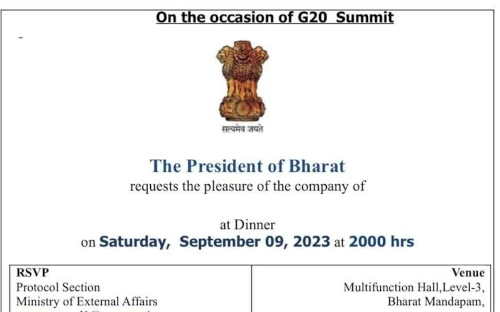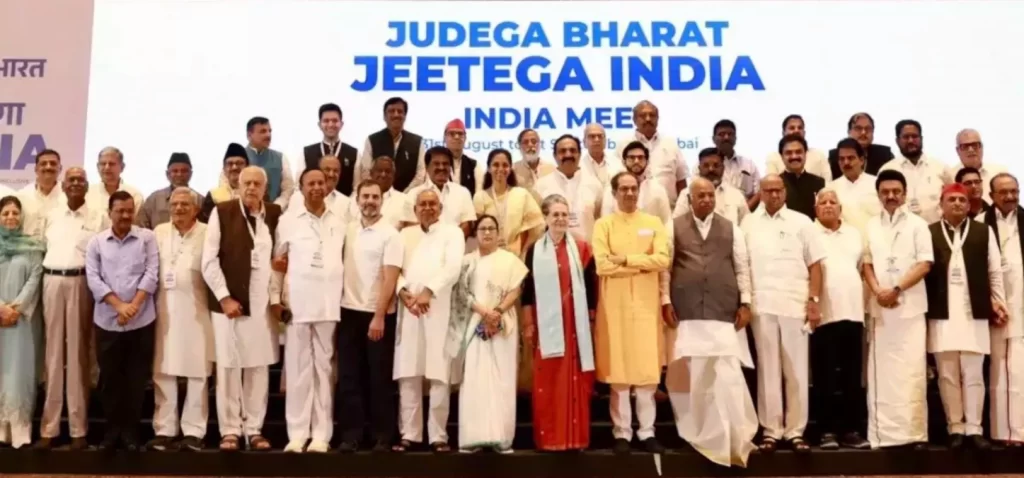It’s possible that the government of India would consider switching the country’s name from “India” to “Bharat,” which is India’s name in Hindi.
The Constitution of India recognises English and Hindi as the country’s two official languages. The English name for the country is India, while the name for the country in Hindi is Bharat. The name “India” originates from the Indus River, the first large river Europeans came across in South Asia. “Sindhu” is the name that the Indians give to the river.
To approve a renaming resolution, the Indian government must obtain a majority vote in both houses of parliament. After the document is ratified, the government must modify the Constitution in at least ten places where the English version includes the phrase “Government of India.”
In the invitation that President Draupadi Murmu extended to the heads of state and government of the G20, she used the title “President of Bharat” rather than “President of India” for the very first time.
In addition, the word “Bharat” was used in a brochure titled “Bharat – Mother of Democracy,” which was handed out to international participants at the G20 meeting.
Pralhad Joshi, who serves as Minister of Parliamentary Affairs, recently announced that a special parliament session will be held in New Delhi from September 18 to September 22. The session will last for five days. However, the exact debate subjects that would be covered during the session have yet to be defined, and some people believe it has been called to propose renaming India.

Nationalistic Agenda
When the ruling BJP came to power, they began altering most old geographical names in a nationalistic manner, often without any particular significance. The BJP has been changing the names of Indian cities with antiquated geographical titles. For instance, they renamed Bombay, Madras, and Calcutta to Mumbai, Chennai, and Kolkata, respectively.
The British founded them and belonged to the East India Company, so they have no historical significance for India. Nonetheless, this did not discourage the BJP. If they rename the major cities with one million or more populations, the country’s name should also be changed, right?
Additionally, the BJP has changed the names of a few smaller cities and roads. It is designed to eradicate a period in Indian history that was ruled by Muslim emperors, which occurred during the mediaeval era.
Because the term “India” originates in both ancient Persian and ancient Greek and is linked to the practice of colonialism by the British, the BJP intends to look for something historically pristine and ideal.
India’s current state of affairs is centred on the hunt for an ideology that could unite the country’s diverse population. Despite this, the government attempts to unite the people under the banner of a single religion and culture, driving some people away. The word Bharat has more affinity to the Northern part of India and has virtually no relevance in the Southern part of India.
A Questionable Timing
In India, using the moniker “Bharat” has already sparked controversy. The opposition has linked the government’s actions to the July adoption of the appellation “India” by an alliance of opposition parties (INDIA, Indian National Developmental Inclusive Alliance).
The Chief Minister of Delhi, Arvind Kejriwal, questioned whether the Narendra Modi government would again alter the country’s name if the opposition alliance used “Bharat” instead of “India.”

Article 1 of the Constitution could read: ‘Bharat, which was India, shall become a Union of States.’ – But even this ‘Union of States’ is now under attack, says Jairam Ramesh, an Indian politician belonging to the Indian National Congress. The Member of Parliament represents Karnataka state in the Rajya Sabha.
In June 2020, the Supreme Court rejected a Public Interest Litigation seeking to remove “India” from the Constitution and retain only “Bharat.” The apex court said India is already referred to as Bharat in the Constitution itself.
The Nationalistic View
BJP is the political wing of the Rashtriya Swayamsevak Sangh (RSS). During his speech in Guwahati, the head of RSS, Mohan Bhagavat, stated that the name “Bharat” has persisted since ancient times, and tradition should be continued.
Origins of Bharat
The terms “Bharat,” “Bharata,” and “Bharatvarsha” can be traced back to Puranic literature as well as the Mahabharata epic. According to the Puranas, Bharata is a land that is sandwiched between the land of the sea in the south and the land of snow in the north. However, India was not a political entity then and was probably referred to as a cultural entity.
The legendary king, the ancestor of the Rig Vedic Bharata tribe and, by extension, the progenitor of all subcontinental peoples, also goes by the name Bharata.
Origins of India
During a lengthy period of Mughal rule, India was known as Hindustan. By the time of the early Mughals in the 16th century, the name ‘Hindustan’ was used to designate the entire Indo-Gangetic plain. In his article titled “From Hindustan to India: Naming Change in Changing Names” in the Journal of South Asian Studies, 2003, historian Ian J. Barrow wrote that in the mid-to late-eighteenth century, Hindustan frequently referred to the territories of the Mughal emperor, which constituted a large portion of South Asia.
In the late 18th century, the name ‘India’ began to replace ‘Hindustan’ on British maps, which had previously included all of South Asia. Barrow wrote that the term’s Greco-Roman associations, lengthy history of use in Europe, and adoption by scientific and bureaucratic organisations such as the Survey of India may have contributed to its popularity.
